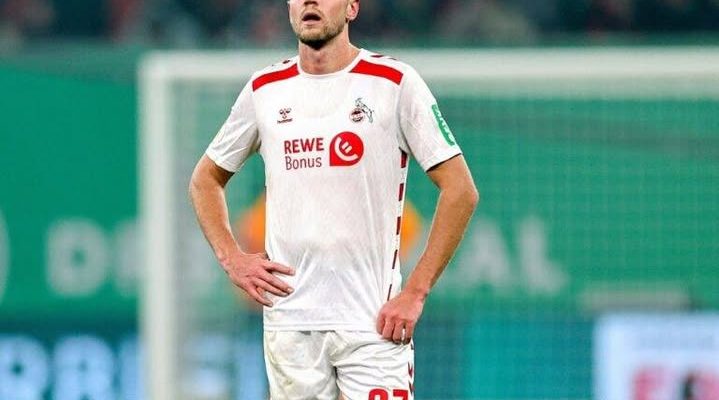Rondić joined 1. FC Köln on 3 February 2025, arriving from Polish side Widzew Łódź and signing a contract until 2029. At the time, Köln described him as “a valuable option for our attack”, emphasising his profile as a classic number‑9, strong in the box and willing to work intensively both offensively and defensively. He was clearly enthusiastic about the move, stating that once he heard of the interest from the club “there was no doubt in my mind” and that he couldn’t wait to get on the pitch.
His career path up to that point had taken him from Bosnia & Herzegovina (with youth stints at clubs like FK Željezničar Sarajevo, FK Olimpik Sarajevo, and FK Mladost Doboj Kakanj) into the Czech Republic (with SK Slavia Prague B and then FK Viktoria Žižkov on loan) and then to FC Slovan Liberec where he made over a hundred appearances.) At Widzew Łódź he had shown promising form (for example 18 appearances with 9 goals before the move) which helped trigger interest.
Once at Köln, he faced a competitive situation. He made nine appearances in the second half of the 2024‑25 season in the 2. Bundesliga and scored one goal. (fc.de) However, it quickly became clear that his chances for regular playing time were limited given the competition for the striker role at the club. On 2 September 2025 Köln announced that Rondić was being loaned to Polish side Raków Częstochowa until the end of the season, so that he could “prove himself on the international stage”. (fc.de) The club official explanation was that the preparation had shown he would have a hard time getting regular minutes at Köln, and that a loan was the mutually sought solution. (fc.de) This loan move means that while his contract with Köln remains until 2029, his season will be spent elsewhere.
In the wider context, the club itself, Köln, had just been promoted back to the Bundesliga after winning the 2. Bundesliga in 2024‑25. That promotion meant higher expectations, a need to strengthen, and thus increased competition for places, which likely had an impact on the decision to loan him out.
Looking at the available media coverage, there are no mentions — at least in major German, Bosnian or Polish outlets — of Rondić formally requesting a release or stating that he wants to leave after the season as a free agent or via a mutual termination. So any suggestion that he “beantragt Freigabe, um den 1. FC Köln nach der Saison zu verlassen” (applies for a release to leave after the season) appears unfounded on publicly available evidence.
Nevertheless, there is room for speculation and plausible interpretation. It is entirely logical that a player in Rondić’s situation — signed with a long contract, but not getting many minutes, and being loaned out within months of joining — might privately contemplate his future and whether a move away could be better for his development. From the club’s perspective, a loan is a normal tool to give a player game time, preserve his contract value, and keep options open rather than simply cutting ties.
Hence, a potential underlying narrative could be: Rondić arrived at the club with high hopes, but the reality of competition, tactical fit, adaptation to German football, and team dynamics meant his path at Köln was blocked. Rather than staying inactive, both parties agreed (or the club insisted) on a loan move. From Rondić’s perspective, this might feel like the start of an exit path — if the loan is successful, he might want to seek permanent departure; if not, he might return but still find himself on the fringes. From the club’s perspective, they maintain his rights (contract until 2029) but opt to not have him stall in their environment.
What likely complicates matters is that while a formal “release application” is not documented, the loan effectively functions as a first step toward a potential exit. A release would mean terminating the contract or negotiating a permanent transfer, whereas a loan leaves options open for both sides. The fact that the loan was agreed so quickly after his arrival may signal that both parties recognized an imperfect fit. The timing — just months after his signing — suggests either that the club mis‑estimated his readiness or he mis‑estimated his chances.
It is also instructive to look at fan and media reaction. On Reddit threads about his signing, some fans were sceptical of the move, with comments like: > “Personally, I think that he is not on a 2. Bundesliga/Bundesliga level, but … when he came to Widzew … we said the same thing.” (Reddit) Others raised concerns about giving a player a long contract (until 2029) when he was being signed as a non‑guaranteed starter. (Reddit) While fans always have opinions, this signals an awareness that the move was somewhat of a gamble.
From Rondić’s perspective the interviews prior to and around his arrival show a strong positive mindset: he was eager, believed in himself and expressed ambition. (fc.de) In a Bosnian‑language interview he said: “My biggest dream is the jersey of the national team of Bosnia & Herzegovina.” (oslobodjenje.ba) That kind of ambition suggests a player keen to maximise his opportunities — which aligns with him accepting a loan to seek more minutes rather than stay on the bench.
Given all this, we can reconstruct the plausible sequence:
He signs for Köln in February 2025 with high expectations both from the club and the player.He makes limited appearances. The club gets promoted, meaning the squad will be strengthened, competition intensifies.By the summer/pre‑season of 2025 the club recognises he will struggle for minutes (officially stated) and a loan to Raków Częstochowa is arranged.The long‑term contract remains in place, meaning Köln retains his registration — giving them the option to bring him back or sell him later.While Rondić may or may not explicitly request a departure, the loan indicates willingness to move and the club’s openness to him playing elsewhere.At this point, rumors of a “release” could easily surface or be speculated about (by fans/media) given the mismatch of initial expectations vs reality, but there is no documented formal request for release.
In journalism and reporting, the difference between “loan/transfer” and “release application” is significant. A release application suggests the player is actively seeking to terminate the contract and leave, potentially for free or via mutual consent. A loan or transfer is a standard business arrangement and does not inherently signal discontent or desire to leave permanently. So, if one were to write an article stating that he has sought release and will leave after the season, one would be going beyond the facts.
It might be worth noting that media articles (for example in n‑tv or Welt) do remark on his loan move. For instance: “Der 1. FC Köln hat seinen Stürmer Imad Rondić kurzfristig an den polnischen Erstligisten Raków Częstochowa verliehen.” (DIE WELT) Meanwhile, another article reports that he and two other players were “aus dem Kader gestrichen” (excluded from the squad) prior to the Bundesliga start by coach Lukas Kwasniok to slim down the roster — with Rondić among them. That sending of a clear signal may feed speculation of “he wants out” or “the club wants to move him on”.
If one wanted to craft a balanced article around the theme of “surprise for the fans” regarding his situation, one could highlight the following angles: the high hopes at signing, the short time frame in which it became clear things were not going perfectly, the expectations of the fans (remembering that Köln fans expected promotion and a strong push back to Bundesliga), the loan move, and then reflect on what might come next for both player and club.


